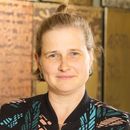Profile
Abstract
Bernadett Bigalke has been a research assistant at the Institute for Religious Studies since 2014. Her research focuses on religion and medicine, modern Catholicism, research on esotericism, New religious movements in the 19th and 20th centuries and the body in religious history. Her teaching offers topics from the European and North American history of religion.
Professional career
- 07/2017 - 06/2019
Mentoring Program for Postdoctoral Researchers - since 10/2021
Leipzig University: Junior Professor at the Institute for the Study of Religion - since 10/2014
Leipzig UniversityResearch Associate at the Institute for the Study of Religion - 09/2013 - 09/2014
University of PotsdamResearch Associate at the Institute für Jewish Studies and Religious Studies - 05/2009 - 10/2010
German Hygiene Museum in DresdenScientific Assistant for the Temporary Exhibition "Religious Energy - About Man and God"
Education
- 10/2005 - 12/2013
University of ErfurtDoctoral Student at the Max Weber Center for Advanced Cultural and Social Studies - 03/2015 - 07/2017
Centre for University Didactics of SaxonyCertificate Program Module 1 and 2 - 10/1997 - 03/2003
University of LeipzigMagister Study in Religious Study and Ethnology
The focus has been on esoteric research and modern Catholicism since the 19th century. Of particular interest is the nature of the relationship between the religious and medical field, as is the role of the human body in the history of religion in modern times.
The current project uses a diachronic comparison to examine marginalized and highly controversial Catholic piety in practice such as radical abstinence from food since the end of the 18th century. In particular, the processes of negotiation between the various interpretative communities are at the center of research from the perspective of the history of knowledge.
A second research project funded by the DFG "When Healing Fails: Cognitive Dissonance and Resilience Factors in Failed Religious Healings. A Comparative Study of Three Local Christianities" investigates how Christian believers cope with failed religious healing and missing miracles. Together with colleagues from the Institute for Religious Studies the ethnographical case studies reconstruct religious performances and narrations in concrete communication situations. Among other things, the goal is to develop a comprehensive typology on the communicative factors of resilience.
- show detailsBigalke, B.„Mir langt der Heiland“: Vorstudie zu religiös begründeter Nahrungsabstinenz im modernen KatholizismusZeitschrift für Religionswissenschaft. 2022. 30 (1). pp. 22–59.
- show detailsBigalke, B.Krankheitslehren, Heilkonzepte und therapeutische Praktiken in Theosophie und Mazdaznan in der ersten Hälfte des 20. JahrhundertsIn: Tulaszekwski, M.; Hock, K. (Eds.)Was Heilung bringt : Krankheitsdeutung zwischen Religion, Medizin und Heilkunde. Bielefeld: transcript. 2020. pp. 21–40.ISBN: 978-3-8376-5042-6
- show detailsBigalke, B.Religion and Medicine in Mazdaznan: Distinction without DifferentiationCompanion to the Study of Secularity. 2019.
- show detailsBigalke, B.Healthy, Happy, Holy: ‚Yoga‘ und Selbstverhältnisse um 1900 und um 1970In: Siegfried, D.; Templin, D. (Eds.)Lebensreform um 1900 und Alternativmilieu um 1980 : Kontinuitäten und Brüche in Milieus der gesellschaftlichen Selbstreflexion im frühen und späten 20. Jahrhundert. Göttingen: V&R unipress. 2019. pp. 61–86.ISBN: 978-3-8471-1012-5
- show detailsBigalke, B.Lebensreform und Esoterik um 1900: Die Leipziger alternativ-religiöse Szene am Beispiel der Internationalen Theosophischen VerbrüderungWürzburg: Ergon Verlag. 2016.ISBN: 978-3-95650-143-2
In teaching, Bernadett Bigalke offers topics from the field of European and North American religious history in the 19th and 20th centuries. In addition to an overview of the history of Christianity, in-depth courses are offered that combine religious history and historical-sociological issues. The range of topics spans religious practices (foodways, pilgrimage, Yoga), history of religious institutions (New religious Movements) as well as cosmological and anthropological issues (esoteric body concepts, ideas of salvation). A second focus in teaching are introductory courses for Bachelor and Master students and colloquia in preparation for the final theses.
